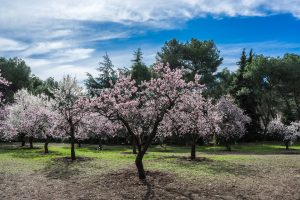
Today is the fifteen of the Hebrew month of Shevat. The Hebrew calendar consists of twelve months, which represent different states in a person’s spiritual development. The month of Shevat is regarded as the beginning of the year for the trees because on this month, the trees begin to awaken toward the end of the winter and the beginning of the spring.
It is written that man is as the tree of the field. Therefore, we celebrate this time of the year as the beginning of man’s spiritual budding. My teacher, RABASH, wrote an elaborate letter about the spiritual meaning of Tu [fifteen] BiShvat [of Shevat], Letter No. 29, which you’re welcome to read in our online archive. Below is the gist of his words.
The order of operations of man’s spiritual development can be compared to the operations we perform on trees if we want them to blossom and yield good fruits.
𝗙𝗲𝗿𝘁𝗶𝗹𝗶𝘇𝗶𝗻𝗴 : This pertains to using the “litter” from our world as fuel and as a substrate on which we grow in spirituality. To succeed in spirituality, we must plant ourselves in an environment that
encourages spiritual growth, an environment that promotes values of giving and loving others. However, the ego keeps spoiling and soiling our love. When we intensify our connection so it is stronger than the ego that emerges between us, we use the egoism as a reason to boost our connection. This is the meaning of fertilizing the tree, meaning the spiritual growth.
𝗛𝗼𝗲𝗶𝗻𝗴: This means we must dig into our hearts and scrutinize the purpose of our being here. The growth of the tree depends on the soil in which we plant it. Then the soil must be cultivated, hoed, and turned inside out. Likewise, we must look into the depth of our heart, bring what is in there to the light, and find the purpose of our lives.
𝗥𝗲𝗺𝗼𝘃𝗶𝗻𝗴 𝗰𝗮𝗹𝗹𝘂𝘀𝗲𝘀: Calluses are signs, indications of our spiritual work. However, our spiritual work must be concealed. Therefore, as we cut out the calluses from the tree, so we must cut out external signs of our spiritual work so as not to evoke envy or bad thoughts from others.
𝗥𝗲𝗺𝗼𝘃𝗶𝗻𝗴 𝗲𝘅𝗰𝗲𝘀𝘀 𝗹𝗲𝗮𝘃𝗲𝘀: Leaves precede the fruit. They represent the works we do in order to come to a state of working for the sake of others. As one approaches that state, these leaves have to be measured carefully and the excess leaves must be removed, so as to allow the fruit, the intention to give, to grow to its maximum potential.
𝗗𝘂𝘀𝘁𝗶𝗻𝗴: We dust the exposed roots and cover them with earth. Sometimes we come to a state of despair and think that we will never rise from our current state. “Dusting” means struggling with these thoughts [in Hebrew, Me’abkim means both “dusting” and “struggling”]. When doubts on our spiritual path appear in us, we must “cover” them up and keep growing.
𝗦𝗺𝗼𝗸𝗶𝗻𝗴 𝘂𝗻𝗱𝗲𝗿 𝘁𝗵𝗲 𝘁𝗿𝗲𝗲: When there are worms in the tree, we spread smoke under it in order to kill them. Smoking represents burning yesterday’s spiritual work and starting over the next day as if from the beginning. This means that at each new spiritual degree, we must leave the previous degree behind, seemingly “burn” it. Otherwise, it hinders our entry into the new level. This is the only way to climb up the spiritual level to the purpose of life.
𝗦𝘁𝗼𝗻𝗶𝗻𝗴 means removing the Avanim [“stones,” as well as “understandings”]. This means we must abandon our previous understandings in order to prepare the ground for new understandings. In the beginning of the work, our understandings are egotistical. We must clean up our hearts from those understandings and absorb new, altruistic ones.
𝗧𝗿𝗶𝗺𝗺𝗶𝗻𝗴 is the final work that RABASH mentions. It means we must trim the dry branches and leaves from the tree so as to allow new one to grow. The old and dry branches and leaves are everything we had acquired from our environment. These must be pruned so as to allow the new, spiritual understandings to grow. However, we must be careful not to grow too many new branches, as this would make us “too smart for our own good,” meaning that we would work too much with our minds and too little with our hearts, with our intentions toward others, which is the heart of our work.
If we follow these customs in our spiritual work with each other, we will have a great year and our spiritual fruit of love of others will be healthy, strong, and beautiful.
#tubishvat #trees #spirituality
Posted on Facebook, The Times of Israel, LinkedIn